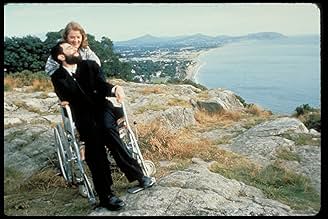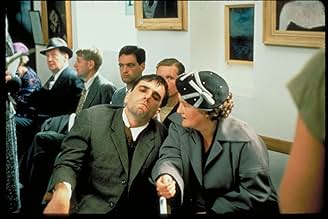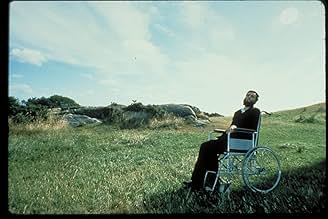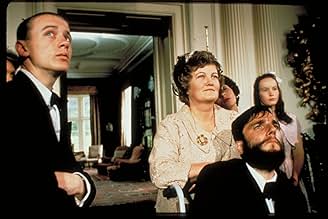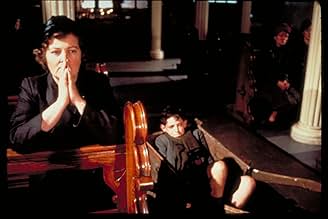Christy Brown nació con parálisis cerebral pero aprendió a pintar y escribir con su única extremidad controlable: su pie izquierdo.Christy Brown nació con parálisis cerebral pero aprendió a pintar y escribir con su única extremidad controlable: su pie izquierdo.Christy Brown nació con parálisis cerebral pero aprendió a pintar y escribir con su única extremidad controlable: su pie izquierdo.
- Dirección
- Guionistas
- Elenco
- Ganó 2 premios Óscar
- 23 premios ganados y 20 nominaciones en total
Pat Laffan
- Barman
- (as Patrick Laffan)
Owen Sharpe
- Young Tom
- (as Owen Sharp)
- Dirección
- Guionistas
- Todo el elenco y el equipo
- Producción, taquilla y más en IMDbPro
Opiniones destacadas
Christy Brown is born with cerebral palsy. His father (Ray McAnally) refuses to give him up and he learns to live with controlling only his left foot. His loving mother (Brenda Fricker) tirelessly raise him. As a child (Hugh O'Conor), everybody assumed that he's a simpleton until he wrote MOTHER with chalk. As a young man (Daniel Day-Lewis), he is rejected by the pretty girl. His father loses his job and becomes abusive. He falls for Dr. Cole (Fiona Shaw) treating his cerebral palsy but she's engaged. As an older man, he falls for his nurse Sheila (Alison Whelan).
It's a tough way to act for Daniel Day-Lewis. It's not just the physicality but he has to make sense despite his speech pattern. He has to be understandable without speaking understandable English. It's his anger and his unlikeability that brings out his humanity. He's not playing a saint or a caricature. It's a real person. It's an all-around performance.
It's a tough way to act for Daniel Day-Lewis. It's not just the physicality but he has to make sense despite his speech pattern. He has to be understandable without speaking understandable English. It's his anger and his unlikeability that brings out his humanity. He's not playing a saint or a caricature. It's a real person. It's an all-around performance.
10llltdesq
Let me state at the outset that I have Cerebral Palsy and I went into this film expecting to have to make allowances for the lead performance. I left the theater half-convinced that they'd cast an actor who had Cerebral Palsy in the role, even though I knew that was not the case. The performances were generally excellent, with a special nod to Brenda Fricker and to Hugh O'Conner (I believe that's his name) as the young Christy Brown. Christy is talented, brash, arrogant, at times vulgar and petulant-in other words, human. This film, along with Gaby: A True Story and the documentary King Gimp, are excellent portrayals of life with CP. By no means a complete portrait, but fine examples of the disabled as human beings. Most highly recommended.
'My Left Foot' is the remarkable story of Christy Brown, born into a working-class Irish family with cerebral palsy. Growing up in a life full of poverty and extreme prejudice, Christy defied everyone's expectations. Using his left foot, the only part of his body he had proper control over, the young man learned to write and paint.
I could spend this review talking about the film's excellent portrayal of working class Ireland, and the working class Irish family specifically. I could talk about how the film does a good job of showing how the attitudes towards Christy Brown changed as Ireland's own political landscape changed. I could probably also talk about the role of women in Christy's life, from his mother and sisters, to the loves in his life. All of these things are worthy of mention.
However, when talking about 'My Left Foot', there is one thing that stands out above everything else; that being Daniel Day-Lewis. Day-Lewis had already proved his acting chops in the excellent 'My Beautiful Laundrette, but it was this movie that put him on the map globally. And rightly so: he is absolutely fantastic as Christy Brown.
Acting is difficult at the best of times, when you're playing a fully-functioning human being. What Day-Lewis achieves, therefore, is even more admirable. It is an extremely effective and realistic portrayal of someone suffering from cerebral palsy, and the actor goes gung-ho with both the physicality expressiveness required for the role. It is a joy to watch.
An honourable mention also needs to go to Hugh O'Conor, who plays the younger Brown. I can only assume that it is even harder for a child to go through the rigours that the role requires, but O'Conor is brilliant. What makes the character difficult to play is that, in trying to make it look real physically, the emotion required can be lost. Both actors avoid that problem with what seems like relative ease: at no point does the efficacy or emotion of the moments falter.
All the other stuff mentioned above are worthy of talking about, if I intended to write a longer review. But for this small thing, I think it is more than enough to say that 'My Left Foot' deserves to be seen just for this landmark Daniel Day-Lewis performance. Whatever you may think of the film as a whole, or whether you care about the story of Christy Brown or not, it is secondary to the simple appreciation for an actor at the top of his game.
I could spend this review talking about the film's excellent portrayal of working class Ireland, and the working class Irish family specifically. I could talk about how the film does a good job of showing how the attitudes towards Christy Brown changed as Ireland's own political landscape changed. I could probably also talk about the role of women in Christy's life, from his mother and sisters, to the loves in his life. All of these things are worthy of mention.
However, when talking about 'My Left Foot', there is one thing that stands out above everything else; that being Daniel Day-Lewis. Day-Lewis had already proved his acting chops in the excellent 'My Beautiful Laundrette, but it was this movie that put him on the map globally. And rightly so: he is absolutely fantastic as Christy Brown.
Acting is difficult at the best of times, when you're playing a fully-functioning human being. What Day-Lewis achieves, therefore, is even more admirable. It is an extremely effective and realistic portrayal of someone suffering from cerebral palsy, and the actor goes gung-ho with both the physicality expressiveness required for the role. It is a joy to watch.
An honourable mention also needs to go to Hugh O'Conor, who plays the younger Brown. I can only assume that it is even harder for a child to go through the rigours that the role requires, but O'Conor is brilliant. What makes the character difficult to play is that, in trying to make it look real physically, the emotion required can be lost. Both actors avoid that problem with what seems like relative ease: at no point does the efficacy or emotion of the moments falter.
All the other stuff mentioned above are worthy of talking about, if I intended to write a longer review. But for this small thing, I think it is more than enough to say that 'My Left Foot' deserves to be seen just for this landmark Daniel Day-Lewis performance. Whatever you may think of the film as a whole, or whether you care about the story of Christy Brown or not, it is secondary to the simple appreciation for an actor at the top of his game.
Daniel Day Lewis is one of the best actors of our time and one of my favorites. It is amazing how much he throws himself in each of the characters he plays making them real.
I remember, many years ago, we had a party in our house - the friends came over, we were sitting around the table, eating, drinking the wine, talking, laughing - having a good time. The TV was on - there was a movie which we did not pay much attention to. Then, suddenly, all of us stopped talking and laughing. The glasses did not clink, the forks did not move, the food was getting cold on the plates. We could not take our eyes off the screen where the young crippled man whose entire body was against him and who only had a control over his left foot, picked up a piece of chalk with his foot and for what seemed the eternity tried to write just one word on the floor. When he finished writing that one word, we all knew that we had witnessed not one but three triumphs - the triumph of a human will and spirit, the triumph of the cinema which was able to capture the moment like this on the film, and the triumph of an actor who did not act but who became his character.
Jim Sheridan's "My Left Foot" is an riveting, unsentimental bio-drama about Christy Brown, the man who was born with cerebral palsy in a Dublin slum; who became an artist and a writer and who found a love of his life.
I like every one of Day Lewis's performances (I have mixed feelings about his performance in GONY) but I believe that his greatest role was Christy Brown in "My Left Foot"
I remember, many years ago, we had a party in our house - the friends came over, we were sitting around the table, eating, drinking the wine, talking, laughing - having a good time. The TV was on - there was a movie which we did not pay much attention to. Then, suddenly, all of us stopped talking and laughing. The glasses did not clink, the forks did not move, the food was getting cold on the plates. We could not take our eyes off the screen where the young crippled man whose entire body was against him and who only had a control over his left foot, picked up a piece of chalk with his foot and for what seemed the eternity tried to write just one word on the floor. When he finished writing that one word, we all knew that we had witnessed not one but three triumphs - the triumph of a human will and spirit, the triumph of the cinema which was able to capture the moment like this on the film, and the triumph of an actor who did not act but who became his character.
Jim Sheridan's "My Left Foot" is an riveting, unsentimental bio-drama about Christy Brown, the man who was born with cerebral palsy in a Dublin slum; who became an artist and a writer and who found a love of his life.
I like every one of Day Lewis's performances (I have mixed feelings about his performance in GONY) but I believe that his greatest role was Christy Brown in "My Left Foot"
Daniel Day-Lewis' almost impossible performance as a man with cerebral palsy earned him a well-deserved Oscar in 1989 for Best Actor over the heavily favoured Tom Cruise in 'Born on the Fourth of July' and Morgan Freeman in 'Driving Miss Daisy'. The Academy was still riding the wave of awarding Dustin Hoffman a second Best Actor prize a year earlier for his performance as a mentally challenged individual in 'Rain Man' and since Day-Lewis' performance was superior to Hoffman's, the Academy had to recognize him. Day-Lewis probably would have won anyway as his performance was hard to ignore and he had never received any acting nominations from the Academy before this film despite turning in great work in such films as 'The Unbearable Lightness of Being' and 'My Beautiful Laundrette.'
As Christy Brown, Daniel Day-Lewis makes his character unsympathetic as he doesn't want you to feel sorry for him. He achieved the great success of being an accomplished writer and artist. Director Jim Sheridan directs the film like a series of home movies that millions want to see.
Brenda Fricker won the Oscar as Best Supporting Actress as Brown's mother and she is the real moral centre of the film and this film proves that Hollywood is capable of choosing small, lesser known films for Oscar consideration and 'My Left Foot' is a film that is uplifting without being sentimental.
As Christy Brown, Daniel Day-Lewis makes his character unsympathetic as he doesn't want you to feel sorry for him. He achieved the great success of being an accomplished writer and artist. Director Jim Sheridan directs the film like a series of home movies that millions want to see.
Brenda Fricker won the Oscar as Best Supporting Actress as Brown's mother and she is the real moral centre of the film and this film proves that Hollywood is capable of choosing small, lesser known films for Oscar consideration and 'My Left Foot' is a film that is uplifting without being sentimental.
¿Sabías que…?
- TriviaAccording to the "Making of My Left Foot" segment on the Special Edition DVD, Sir Daniel Day-Lewis broke two ribs during filming from assuming the hunched-over position in his wheelchair for weeks of filming. He also would refuse to come out of character. On visits to the set canteen, other people would have to help him with food. On one visit from his English agent, Day-Lewis again refused to come out of character as Christy Brown, and his frustrated agent took off.
- ErroresIn the beginning of the movie, when Mary Carr gets Christy Brown into the library, the shadow of the boom mic can clearly be seen on a white door.
- Citas
Christy Brown: I've had nothing but Platonic love all me life. Do you know what I say? FUCK PLATO! And fuck all love that's not a hundred percent commitment!
- Bandas sonorasFoggy Dew
(uncredited)
Traditional
Selecciones populares
Inicia sesión para calificar y agrega a la lista de videos para obtener recomendaciones personalizadas
- How long is My Left Foot?Con tecnología de Alexa
Detalles
- Fecha de lanzamiento
- Países de origen
- Sitios oficiales
- Idioma
- También se conoce como
- Mi pie izquierdo: la historia de Christy Brown
- Locaciones de filmación
- Productoras
- Ver más créditos de la compañía en IMDbPro
Taquilla
- Presupuesto
- GBP 600,000 (estimado)
- Total en EE. UU. y Canadá
- USD 14,743,391
- Fin de semana de estreno en EE. UU. y Canadá
- USD 41,165
- 12 nov 1989
- Total a nivel mundial
- USD 14,743,391
Contribuir a esta página
Sugiere una edición o agrega el contenido que falta



